|
| Regulatory Context
In the wake of the Oakland Ghost Ship Warehouse fire, several Richmond properties have made the news and sparked a debate about whether certain types of building occupants should be exempt from health and safety laws.
The basic safety requirement comes from a state statute, not local ordinances. California state law (Health and Safety Code 13146.2) requires annual fire inspections of non-residential structures.
Health and Safety Code 13146.2. (a) Every city or county fire department or district providing fire protection services required by Sections 13145 and 13146 to enforce building standards adopted by the State Fire Marshal and other regulations of the State Fire Marshal shall, annually, inspect all structures subject to subdivision (b) of Section 17921, except dwellings, for compliance with building standards and other regulations of the State Fire Marshal.
(b) A city, county, or district that inspects a structure pursuant to subdivision (a) may charge and collect a fee for the inspection from the owner of the structure in an amount, as determined by the city, county, or district, sufficient to pay the costs of that inspection. A city, county, or district that provides related fire and life safety activities may charge and collect a fee for the inspection from the owner of the structure in an amount, as determined by the city, county, or district, sufficient to pay the costs of that inspection.
(c) The State Fire Marshal, or his or her authorized representative, who inspects a structure subject to subdivision (b) of Section 17921, except dwellings, for compliance with building standards and other regulations of the State Fire Marshal, may charge and collect a fee for the inspection from the owner of the structure. The State Fire Marshal may also charge and collect a fee from the owner of the structure for related fire and life safety activities, such as plan review, construction consulting, fire watch, and investigation. Any fee collected pursuant to this subdivision shall be in an amount, as determined by the State Fire Marshal, sufficient to pay the costs of that inspection or those related fire and life safety activities. (Amended by Stats. 2008, Ch. 760, Sec. 6. Effective September 30, 2008.)
Such inspections and compliance are not discretionary; they are mandatory. A public official who makes a decision not to comply could find him or herself in deep trouble. Where there is a change in occupancy of an existing structure, the structure must be fully brought up to code requirements for the new occupancy (California Fire Code A 102.3), such as when a storage structure is converted to a workplace or residence. Section 109 of the California Fire Code makes the owner responsible for correction of violations and provides a range of remedies to the fire code official including legal penalties, civil orders, mandatory vacation and disconnection of utilities.
Nevertheless, there has been a hue and cry to exempt structures used or occupied by artists, musicians, people attending concerts or even horses from state laws requiring safety. The arguments are based on the premise that that those activities have such a high social and/or cultural value (music and art, horseback riding) and/or that the practitioners are unable to afford the cost of code compliant space. Advocates believe the City has a moral or political mandate to apply a different set of standards to art and music related venues and structures. Unfortunately, the City does not have that discretion.
There are also issues of bot fairness and constitutionality. Would it be fair to exempt some business owners or operators from requirements, including fees, that others playing by the rules are required to pay based on a subjective argument that they have greater value to society or are less able to bear the cost? The City can adjust fees, but it cannot adjust code requirements. There are some fee exemptions for businesses making less than $600, for juveniles, non-profits and for veterans.
The Equal Protection Clause of the Fourteenth Amendment to the United States Constitution provides that no state shall deny to any person within its jurisdiction "the equal protection of the laws." A primary motivation for this clause was to validate the equality provisions contained in the Civil Rights Act of 1866, which guaranteed that all people would have rights equal to those of all citizens. The Equal Protection Clause is also interpreted to require government to treat the subjects of regulation equally, unless there are fair and compelling reasons to do otherwise.
There is also a concern about rewarding specific activities for being effete or elitist. Why should an artist get substandard space with low rent legally when the same is not offered to someone who sells tacos or repairs shoes? And how about property owners? Should a property owner be allowed to take a warehouse with a market rent of $0.50 per square foot and illegally rent it to an artist as a workshop or a place to live for $2.50 per square foot?
Another argument I hear is that the City has an obligation to provide spaces for artists and music performers that are code conforming at an affordable price. Such an investment of public money is a political choice made by the City Council, and to some extent that is already being done. The City of Richmond heavily subsidizes the two highest profile venues in the City, the Richmond Art Center and the East Bay Center for Performing Arts. The City also provides support for NIAD.
Take a look at this summary by Cushman and Wakefield for warehouse space in Richmond at the end of the 3rd Quarter of 2016. The going rate is less than $0.50/square foot, and there is over a million square available, yet artists are paying places like Bridge Art and Storage as much a $1.50 to $2.50 a square foot and believing it is a bargain.
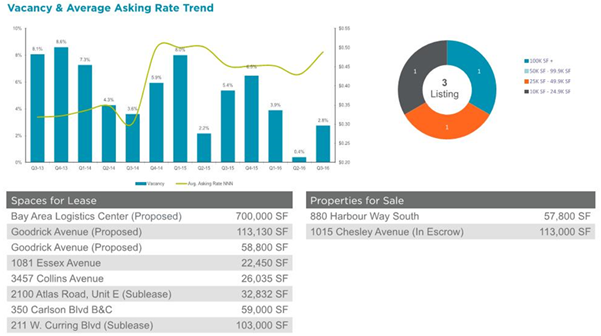
Manufacturing space in Richmond is going for about $0.80/square foot, and there is over 300,000 square feet available.
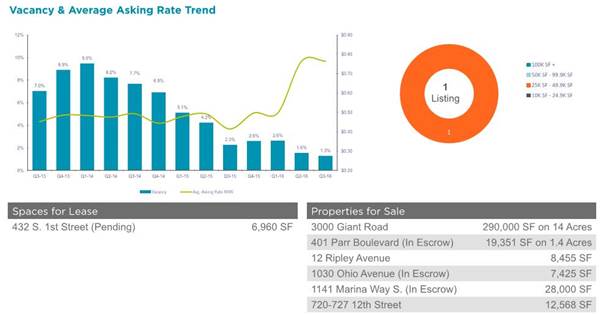
Licenses and Permits
Like many other cities, the “portal” for getting into the inspection database in Richmond is a business license. A basic annual business license, which is technically just a tax and not an authorization to conduct a business, costs $234.10. Once in the system, a commercial property or space is supposed to be scheduled for an annual fire inspection, which costs $117.00 for a “mercantile inspection.”
In the past, the City of Richmond has not been proactive in enforcing the requirement that all businesses have a current license. If a business was motivated to apply for a license, the City was happy to take their money. If not, no one cared. If a business license expired, the holder was sometimes sent a renewal application. If the license was not renewed, the business dropped out of the system. From the City’s standpoint, it no longer existed. Businesses loved this – no cost, no hassle, no problem! That has now changes, and one full-time City staff member and a consulting firm are ferreting out non-licensed businesses. They have found hundreds and collected hundreds of thousands of dollars.
Specific Examples
Two of the locations that have been in the news lately, the commercial horse boarding operation on Giant Road and the Bridge Storage and Art Space have issues that predated the Ghost Ship fire. The third, Burnt Ramen at 111 Espee Avenue , attracted new attention because of its use as an unpermitted concert venue.
Burnt Ramen
Burnt Ramen was brought to my attention by a social media author, and I turn, brought it to the attention of Code Enforcement. I have no idea whether or not it has code issues, but you can go to the City of Richmond online Business License Search and look for Burnt Ramen at 111 Espee Avenue. It will tell you that Burnt Ramen Records applied for and obtained business license 40002599 in 2001, which expired on August 27, 2002. There is no record of any inspections at all. Burnt Ramen’s website describes it as “an unsafe place for all ages.” It also states that Burnt Ramen includes , “a stage for live shows as well as our recording studio and rehearsal space.” It goes on to state, “Unfortunately, As of March 2003 we have been unable to host live shows.” But according to Songkick, Burnt Ramen has hosted 65 concerts since 2001, the latest on November 21, 2016.
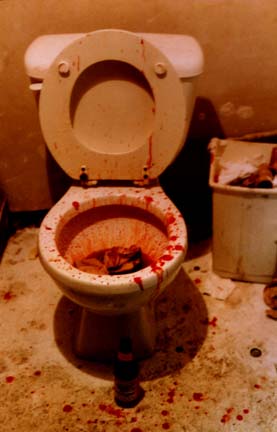
From the Burnt Ramen website
About Burnt Ramen’s “closing”, the website says:
Well its true. Burnt Ramen's venue is effectively shut down. Burnt Ramen shows are nada mas! The Fire Marshall inspected us on wed afternoon and last night the pigs showed up and made it clear the intentions of the city/fire Marshall/pigs that they want Burnt Ramen shut down or forced to fit into a business mold. I refuse to compromise my artistic vision in order to keep the Ramen operating. I live by the code of NO RULES, NO SIGNS, and NO RESTRICTIONS and so therefore will not try to make Burnt Ramen a business that's up to code and respected by the mainstream money minded morons.
The recording studio is still in full operation and we are encouraging outside producers to utilize the place. We still have rehearsal space for bands, we just can't do shows anymore. We probably could meet the fire code and probably could have shows as long as people weren't out on the street, during and in between bands, painting graffiti and throwing their trash around. But in order to do that we would have to put up signs, have security, and then if cops did come to check us out and if we weren't ID ing people and if we weren't stopping people from smoking, they would still shut us down. The reason Burnt Ramen was great was because it provided a space where musicians could relax and be themselves because there were no rules they had to conform to. So even if we met the regulations and jumped through their hoops the Ramen would never be the same, we would be beating a dead horse and that is not my style.
Burnt Ramen is an example of an apparent business that is flying under the City’s Radar.
Bridge Storage and Art Space
Bridge Storage and Art Space has an active business license (#40001532) under “Bridge Self Storage” that expires December 31, 2016. It says nothing about Art. Bridge Self Storage was issued a Fire Department permit in 2014, 2015 and 2016, but it is for storage, not for art studios.
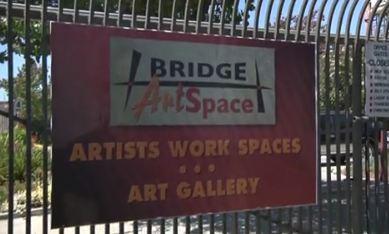
By every measure except one, the conversion of Bridge Self Storage to Bridge Storage and Art Space has been a success for the owners, for the community and the artists. I have attended many events there myself. The failed measure is the one that involves code compliance and safety. The discussion that is going on now on social media is déjà vu from nearly three years ago, when an East Bay Express article, “Artists at the Bridge Get a New Life,” stated:
About four years ago, business was flagging at Bridge Storage, a 580-unit self-storage facility that butts up against a train yard. The owners had grown tired of wringing their hands behind the facility's gates, waiting for moneyed clients from Oakland and Berkeley to come store their belongings. They decided to make a change. The father and son owners, Jim and Jeff Wright, converted some storage units into art and music studios and offered them to local artists at affordable prices.
The Wrights changed the name of the business from "Bridge Storage" to "Bridge Storage and Art Space" and transformed 25 units into artist and musician work studios by adding French doors, skylights, insulation, and some plumbing. The converted studios leased out quickly and there is a now a long waiting list for the workspaces, which rent for $1.50 to $2.50 per square foot, according to Jeff Wright. The Bridge quickly became a focal point for artists to gather, barter, network, and inspire one another. The Art Space's community room also became a popular spot for art showings and a meeting place for nonprofits, such as the urban farming group Urban Tilth and civic-minded organizations like the Santa Fe Neighborhood Association.
Like now, in late 2016, the property came under scrutiny by City officials:
But as the Bridge Storage and Art Space became more popular, it also caught the attention of Richmond city officials who threatened to close down the workspaces earlier this month because they had been built for storage — not as work spaces — and thus did not meet building or safety codes.
The artists' community quickly mobilized and sent out emails and letters to the media and city council members. Mayor Gayle McLaughlin and Councilmember Jovanka Beckles asked City Manager Bill Lindsay to see if there was some way to avoid evicting the artists. "These kinds of evictions are terrible and too often it's the artists who have to pay the price by moving out," McLaughlin said. "We asked the city manager to try and find a positive solution that would allow the artists to stay in their studios."
Lindsay arranged a meeting at the art space so that the facility's owners, employees, and artists could meet with representatives from the planning and fire departments. After touring the facility, the city agreed to give the Wrights until February 1 to produce architectural plans for bringing the studios up to code.
"They have a good project. What they're doing is tremendous, but just because you have a good project, it doesn't mean you get a pass on codes," said Planning Director Richard Mitchell. "But I think we've found a way through. We're going to give them a chance to put together some plans to install heating, insulation, fire separation, and electrical service to get the studios up to code."
The problem is that, according to the Planning and Building Department, no changes have been made, and it’s puzzling why not. The $1.50 to $2.50 per square foot rent quoted in the article is no bargain. It was high at the time and is still above current market rents for comparable but code conforming space in Richmond, even in Point Richmond. Yesterday, the owner of Bridge Storage and ArtSpace wrote on Nextdoor:
"I am the owner of Bridge Storage and ArtSpace.
I appreciate everyone's concern here, and I am super sad that we've been ordered to stop non-storage occupancy of our spaces. But I can't blame the City for enforcing rules (under state law) that they've been kind enough to let slip with us for the past several years while we've worked through the sometimes tortuous process of planning and permitting. Especially now, they are under a lot of stress, and we need to remember that their primary purpose is to protect the public safety. While I'm frustrated by the situation, at a higher level I'm grateful for their efforts.
A little more background: We did happily get permits a couple of months ago, and have begun the construction phase, installing upgraded electrical power and sprinkler systems. I was hoping that we could do this slowly and within our cash flow constraints, but that equation has now changed because we can't occupy the space while we fix it. So at the moment we're looking at ways to chunk the work differently to come up with a more viable long term solution for providing affordable workspace to our beloved artists. I think it will be 6 months or so before spaces come back online, with valid Certificates of Occupancy.
We will get our act together, and Bridge will buzz again!
For anyone to blame the City of Richmond for this makes no sense. As we have seen, the City was enforcing the law. Permits were issued. But the owners have not done the required work. I hope this has a happy ending.
Giant Road Horse Stables
There are several pieces of property along the railroad tracks on the industrial fringe of Richmond that are operating what are called “illegal transfer stations.” These are places where people can drop off large amounts of trash and debris for a fraction of the cost of taking it to a regulated dump or real transfer station. Then the trash “goes away,” ending up back on some country road or your city street where it gets dumped by people running the illegal transfer stations. And the public then pays to have it picked up and hauled to a regulated dump.
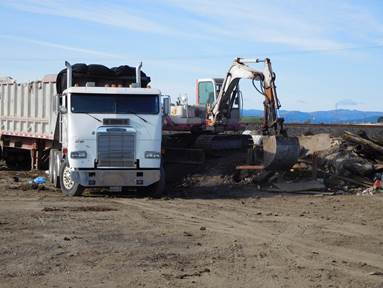
Final cleanup of one of the illegal transfer stations
In the process of investigating and closing down the illegal transfer stations (two on this particular property), City code enforcement staff discovered a completely concealed commercial stable operation packed in among the illegal dumps. The operation was invisible form the road, had no business license, no permits and no record of fire inspections. Neither was the property zoned for such a use. The stables were built from scrap wood, scrap metal roofing and plastic sheeting. Waste was not being cleaned up and was polluting the local waterway.
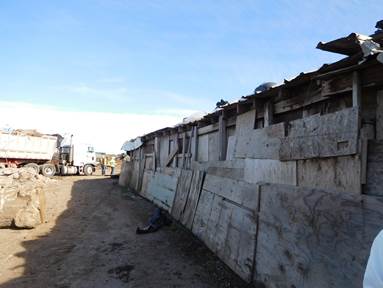
Back of stables next to illegal transfer station
The stables are also a firetrap, a fact that is particularly sensitive with the recent “Ghost Ship” warehouse fire in Oakland that killed 36 people. Even though it is a stable, the buildings are occupied by people caring for the horses and by horse owners. It would have required a building permit to construct.
City inspectors had no choice about issuing notices of violations. In addition to the code violations, the facility does not meet minimum “Minimum Standards of Horse Care in the State of California,” published by the Center for Equine Health, School of Veterinary Medicine, University of California, Davis CA.
· Horses are not supplied with …clean water.
· Horses so not get adequate exercise (“Horses confined in stalls with minimal space should receive at least 30 minutes of free time (turnout) or 15 minutes of controlled exercise per day (e.g., hand-walking, lungeing, riding, driving, hot walker, treadmill, Euroiser) unless directed otherwise by a veterinarian.”)
· Stalls are not regularly or sufficiently cleaned (“Excessive feces, urine, mud and other waste products must not accumulate within the housing enclosures. lean and sanitary surroundings within the confines of any equine facility are absolutely essential for the health and welfare of the horses and to avoid unnecessary environmental contamination. The average horse defecates once every two hours (an average of 12 times per day). On average, this totals 54 pounds of feces per day.”
· The area is not properly drained (“Standing water, mud or urine should be prevented from accumulating in housing enclosures by proper drainage or absorbent bedding materials. Standing ground surface water provides optimal breeding grounds for disease transmitting insects and for microbial contamination of the environment.”)
I talked to a veterinarian familiar with the stables, and he told me that everything about it was substandard but he had not seen anything that was at the level of animal cruelty. The County Animal Control people told me about the same thing.
A city council member who boarded a horse at Giant Road told me:
Many of the stalls are in atrocious condition with days of manure and old bedding. Some horses too are neglected. This info is from an equine dental practitioner who knows the property well and expounded on the booze, drugs, prostitution and partying until all hours. …I have seen the conditions personally. Among other things, the entire facility of ramshackle buildings is certainly a fire hazard. all conscience Tom, I can't support the people after all who rent from the owner, Diane. The problem is hers though, and it is going to be a big job to get all that shit removed and the horses relocated.
The owner of the property promptly gave everyone eviction notices. She cleaned up the dumpsites, but the stables remain for the time being. The City has taken a go-slow approach to give the horse owners time to find other locations, and half or more of the horse have been relocated. There is no evidence that any of the horses are headed for the glue factory. One person I talked to at the stables told me he paid $6,000 for his horse and another $6,000 to have it trained. Since 1998, it has been illegal in California to slaughter horses, sell horsemeat or to send horses out of California for slaughter in other states or countries for human consumption.
Despite all this, there is a petition circulating nationwide, “Save the Stables in Richmond, CA and Stop Horse Slaughter.”
We have approached the East Bay Regional Park District about establishing a stable in the nearby 3,000 acre Point Pinole Regional Park, and we will be placing a resolution on the next City Council agenda making that request. |
|

